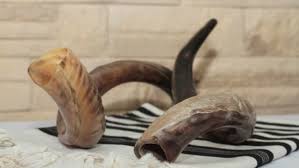
Bamako: 18:07-18:56, Dakar : 18:44-19:34, Masvingo 17:35-18:25, Kinshasa : 17:35-18:25,
Abuja : 18:05-18:54, Lagos : 18:22-19:11, Enugu : 18:05-18:55, Abia : 18:06-18:55, Delta : 18:08-18:58, Anambra :18:07-18:56, Imo : 18:07-18:57, Harare : 17:33-18:24, Yaoundé : 17:49-18:39, Antananarivo : 17:28-17:20, Accra : 17:36-18:24.
Rosh Hashana
Start: Sunday 29 September 17:34
End: Tuesday 1st October 18:26
The Parshah of Nitzavim includes some of the most fundamental principles of the Jewish faith: The unity of Israel: “You stand today, all of you, before the L‑rd your G‑d: your heads, your tribes, your elders, your officers, and every Israelite man; your young ones, your wives, the stranger in your gate; from your wood-hewer to your water-drawer.”
The future redemption: Moses warns of the exile and desolation of the Land that will result if Israel abandons G‑d’s laws, but then he prophesies that in the end, “You will return to the L‑rd your G‑d . . . If your outcasts shall be at the ends of the heavens, from there will the L‑rd your G‑d gather you . . . and bring you into the Land which your fathers have possessed.”
The practicality of Torah: “For the mitzvah which I command you this day, it is not beyond you, nor is it remote from you. It is not in heaven . . . It is not across the sea . . . Rather, it is very close to you, in your mouth, in your heart, that you may do it.”
Freedom of choice: “I have set before you life and goodness, and death and evil: in that I command you this day to love G‑d, to walk in His ways and to keep His commandments . . . Life and death I have set before you, blessing and curse. And you shall choose life.”
-Rosh Hashana
The Mishna teaches that the bull’s horn is not kosher for the sound of the shofar because the bull makes recall the calf that makes remember the fault of the golden calf. And there is a rule that says, “The accuser can not be the defender”. Shofar being the means to change divine conduct. From the conduct of the duality of judgment to the conduct of unity, clemency. So what remembers the fault (the duality) can in no case awaken clemency, the return to unity.
The Talmud is asking the same question about the Yom Kippur service. The high priest must be introduced into the holy of holies in white clothes and not in ceremonial garments woven of gold threads because the accuser (the gold of his clothes is reminiscent of the fault of the golden calf) can not to be the defender.
The Talmud then asks: why is the high priest dressed in his golden garments in the courtyard of the temple? The Talmud responds because this principle “an accuser can not be the defender” only applies to services in the holy of holies on Yom Kippur and not to services that are done outside the holy of holies on that day. The Talmud then asks, “If this is so, the shofar ringing on Rosh Hashanah is in the temple court and therefore, the principle” the accuser can not be the defender “should not apply to the bull’s horn? “
The Talmud answers: “The shofar’s ringing has the same power as the entrance of the high priest into the holy of holies.”
What does the holy of holies represent ?
Entry into the holy of holies is a change in the level of perception of reality. From a reality where duality reigns, the high priest enters a reality where divine unity reigns. He transports himself by scrutinizing and concentrating his gaze on the holy ark between the two cherubim who are in fact the two angels who guard the gate of the Garden of Eden from which the first man was expelled. At this moment the high priest must be of a sparkling purity without any asperity, so he must take off his clothes that remind the duality of the fault. So when we focus on listening to the shofar ring, we are preparing to change the level of reality, from duality to divine unity. We enter a dimension where all fault, all impurity is crippling. And so the teshuvah is obligatory at the time of the ringing of the shofar in order to be able to change the level of perception.
